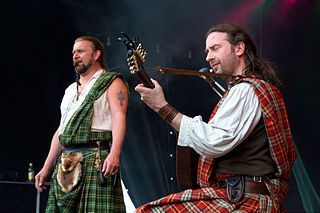
Celtic music is a broad grouping of music genres that evolved out of the folk music traditions of the Celtic people of Western Europe. It refers to both orally-transmitted traditional music and recorded music and the styles vary considerably to include everything from "trad" (traditional) music to a wide range of hybrids.

A fiddle is a bowed string musical instrument, most often a violin. It is a colloquial term for the violin, used by players in all genres including classical music. Although in many cases violins and fiddles are essentially synonymous, the style of the music played may determine specific construction differences between fiddles and classical violins. For example, fiddles may optionally be set up with a bridge with a flatter arch to reduce the range of bow-arm motion needed for techniques such as the double shuffle, a form of bariolage involving rapid alternation between pairs of adjacent strings. To produce a "brighter" tone, compared to the deeper tones of gut or synthetic core strings, fiddlers often use steel strings. The fiddle is part of many traditional (folk) styles, which are typically aural traditions—taught 'by ear' rather than via written music.
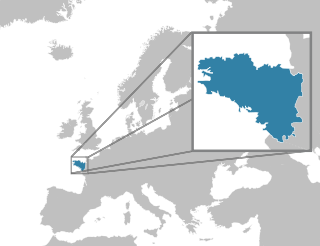
Brittany is a cultural region in the west of France, covering the western part of what was known as Armorica during the period of Roman occupation. It became an independent kingdom and then a duchy before being united with the Kingdom of France in 1532 as a province governed as a separate nation under the crown.

The Duchy of Brittany was a medieval feudal state that existed between approximately 939 and 1547. Its territory covered the northwestern peninsula of Europe, bordered by the Atlantic Ocean on the west, the English Channel to the north. It was less definitively bordered by the Loire River to the south, and Normandy and other French provinces to the east. The Duchy was established after the expulsion of Viking armies from the region around 939. The Duchy, in the 10th and 11th centuries, was politically unstable, with the dukes holding only limited power outside their own personal lands. The Duchy had mixed relationships with the neighbouring Duchy of Normandy, sometimes allying itself with Normandy, and at other times, such as the Breton-Norman War, entering into open conflict.
Since the early 1970s, Brittany has experienced a tremendous revival of its folk music. Along with flourishing traditional forms such as the bombard-binou pair and fest-noz ensembles incorporating other additional instruments, it has also branched out into numerous subgenres.
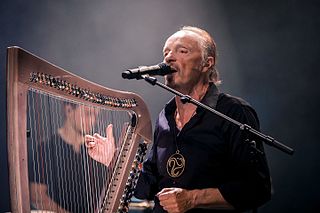
Alan Stivell is a French, Breton and Celtic musician and singer, songwriter, recording artist, and master of the Celtic harp. From the early 1970s, he revived global interest in the Celtic harp and Celtic music as part of world music. As a bagpiper and bombard player, he modernized traditional Breton music and singing in the Breton language. A precursor of Celtic rock, he is inspired by the union of the Celtic cultures and is a keeper of the Breton culture.

Cape Breton fiddling is a regional violin style which falls within the Celtic music idiom. Cape Breton Island's fiddle music was brought to North America by Scottish immigrants during the Highland Clearances. These Scottish immigrants were primarily from Gaelic-speaking regions in the Scottish Highlands and the Outer Hebrides. Although fiddling has changed considerably since this time in Scotland, it is widely held that the tradition of Scottish fiddle music has been better preserved in Cape Breton.

Celtic music is primarily associated with the folk traditions of Ireland, Scotland, Brittany and Wales, as well as the popular styles derived from folk culture. In addition, a number of other areas of the world are known for the use of Celtic musical styles and techniques, including Newfoundland, and much of the folk music of Canada's Maritimes, especially on Cape Breton Island and Prince Edward Island.
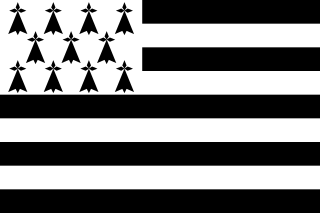
Breton nationalism is a form of regional nationalism associated with the region of Brittany in France. The political aspirations of Breton nationalists include the desire to obtain the right to self-rule, whether within France or independently of it, and to acquire more power in the European Union, United Nations and other international institutions.
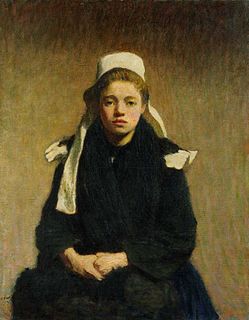
The Bretons are a Celtic ethnic group native to Brittany. They trace much of their heritage to groups of Brittonic speakers who emigrated from southwestern Great Britain, particularly Cornwall and Devon, mostly during the Anglo-Saxon settlement of Britain. They migrated in waves from the 3rd to 9th century into Armorica, which was subsequently named Brittany after them.

The Festival Interceltique de Lorient (French), Gouelioù Etrekeltiek An Oriant (Breton) or Inter-Celtic Festival of Lorient in English, is an annual Celtic festival, located in the city of Lorient, Brittany, France. It was founded in 1971 by Polig.

The bombard is a contemporary conical-bore double-reed instrument widely used to play traditional Breton music. The bombard is a woodwind instrument, and a member of the shawm family. Like most shawms, it has a broad and very powerful sound, vaguely resembling a trumpet. It is played as other shawms are played, with the double reed placed between the lips. The second octave is 'over-blown'; achieved via increased lip and air pressure or through the use of an octave key. It plays a diatonic scale of up to two octaves, although contemporary instruments frequently have added keywork permitting some degree of chromaticism. A bombard player is known as a talabarder after 'talabard', the older Breton name for the bombard.
Scottish fiddling may be distinguished from other folk fiddling styles by its particular precision of execution and energy in the delivery, for example, the rendering of the dotted-quaver/semi-quaver rhythmic patterns, commonly used in the Strathspey. Christine Martin, in her Traditional Scottish Fiddling players guide, discusses the techniques of "hack bowing", "the Scottish Snap", and "snap bowing". These techniques contrast quite sharply with the most common bowing patterns of Irish fiddling. The style has a very large repertoire consisting of a great variation of rhythms and key signatures. There is also a strong link to the playing of traditional Scottish bagpipes which is better known throughout the world.
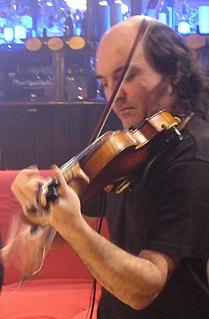
Jacky Molard is Breton musician referred to as important in the region. He plays fiddle, guitar and bass. He is or has been a member of Gwerz, Pennou Skoulm, the Jacky Molard Acoustic Quartet, and has also played in various groups with Erik Marchand such as Taraf de Caransebes. He is also a composer and producer. Jacky created the "Innacor" Breton/World music label in 2005 along with Erik Marchand and Bertrand Dupont. He has also worked with musicians outside Brittany such as Foune Diarra.

The piston is a type of oboe invented by Breton musician, teacher, and luthier Youenn Le Bihan in 1983. The pistoñ is a contemporary development of the hautbois, classical and/or baroque oboe, influenced by the bombard or talabard, the traditional double reed instrument of Brittany. It is typically rooted in the key of D and features post-mounted simple system key-work to expand its range. The tone of the pistoñ stands in a warm and rich middle ground between the trumpet-like tone of the bombard and that of the baroque oboe. The bore is similar to that of a baroque or classical oboe.

Celtic Wedding is an album of traditional Breton music performed by the Irish band The Chieftains. The album features guest performances by Breton artists Nolwen Monjarret, Bernard Pichard, Alain Guerton and Michel Bertae. Nolwen Monjarret later appeared on the Chieftains' 1991 album, The Bells of Dublin, performing "A Breton Carol" with the band.

Kornog is a Breton folk music band formed in the 1980s. They are notable in that they have been perhaps the only Breton band to have had a serious touring presence in the United States, so for many in North America, Kornog defines Breton music. The word "kornog" means “west” in the Breton language.

Red Cardell is a Breton rock band that mixes Breton music with rock, folk, blues, world music and chanson réaliste.
Celtic Fiddle Festival is a group of Celtic fiddlers active since 1993. Representing the three main branches of Celtic culture, the members were Johnny Cunningham of Scotland, Kevin Burke of Ireland, and Christian LeMaitre of Brittany. Since Cunningham's death in 2003, the group has continued to perform, replacing him with Andre Brunet from Quebec.
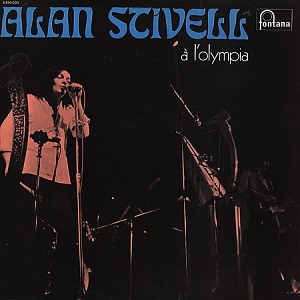
À l'Olympia was Stivell's first live album, recording at L'Olympia. It was released by Fontana in 1972.

















